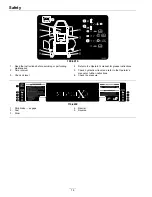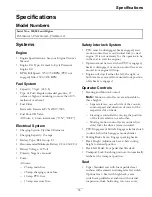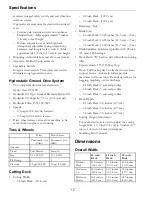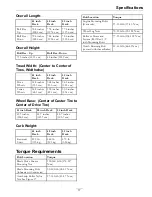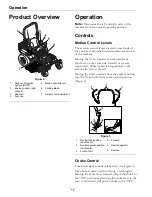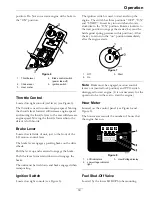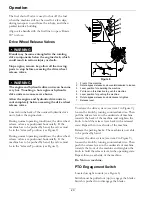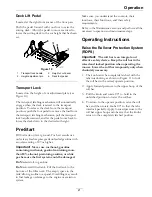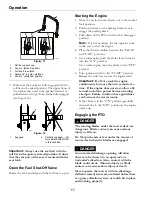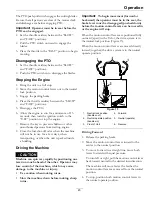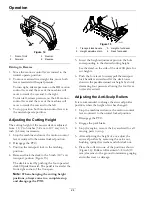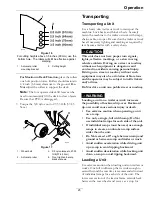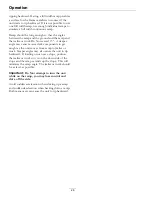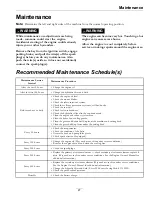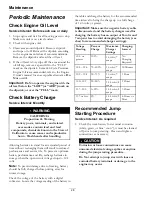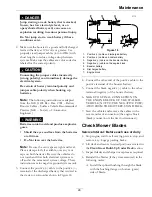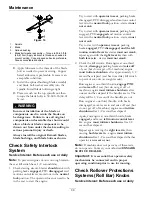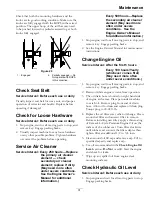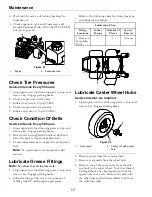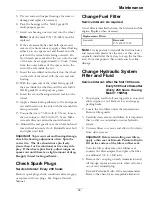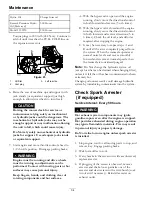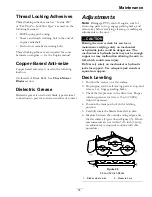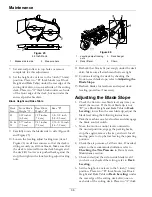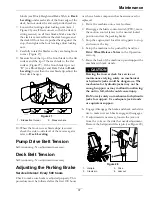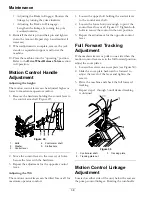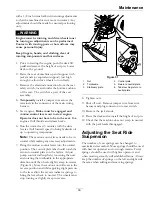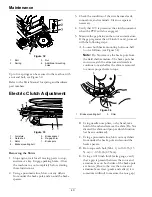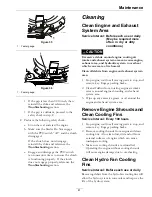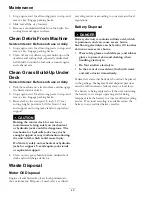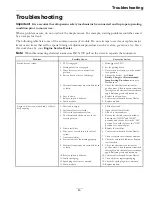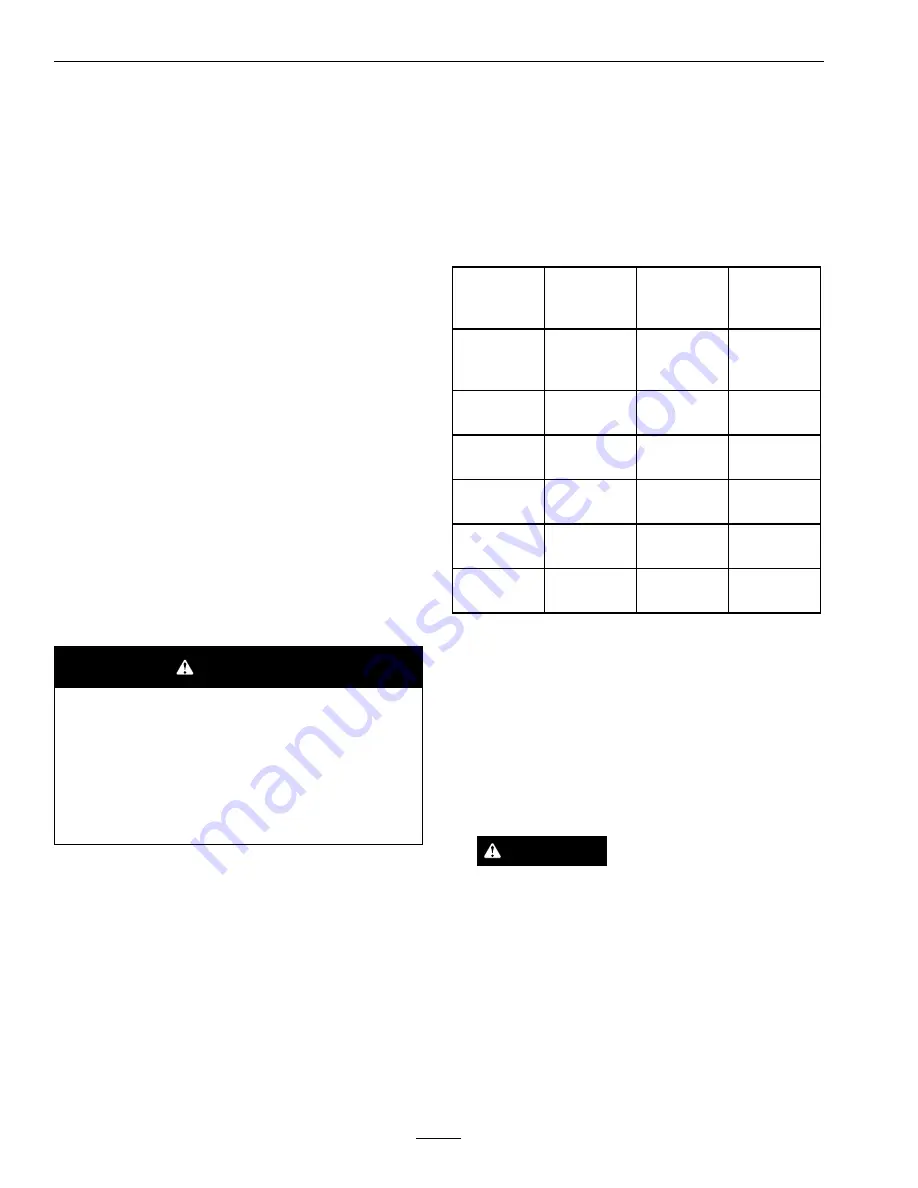
Maintenance
Periodic Maintenance
Check Engine Oil Level
Service Interval: Before each use or daily
1. Stop engine and wait for all moving parts to stop.
Make sure unit is on a level surface.
2. Check with engine cold.
3. Clean area around dipstick. Remove dipstick
and wipe oil off. Reinsert the dipstick according
to the engine manufacturer’s recommendations.
Remove the dipstick and read the oil level.
4. If the oil level is low, wipe off the area around the
oil fill cap, remove cap and fill to the “FULL”
mark on the dipstick. Exmark 4-Cycle Premium
Engine Oil is recommended; refer to the Engine
Owner’s manual for an acceptable alternative.
Do
Not
overfill.
Important:
Do Not operate the engine with the
oil level below the “LOW” (or “ADD”) mark on
the dipstick, or over the “FULL” mark.
Check Battery Charge
Service Interval: Monthly
WARNING
CALIFORNIA
Proposition 65 Warning
Battery posts, terminals, and related
accessories contain lead and lead
compounds, chemicals known to the State of
California to cause cancer and reproductive
harm. Wash hands after handling.
Allowing batteries to stand for an extended period of
time without recharging them will result in reduced
performance and service life. To preserve optimum
battery performance and life, recharge batteries in
storage when the open circuit voltage drops to 12.4
volts.
Note:
To prevent damage due to freezing, battery
should be fully charged before putting away for
winter storage.
Check the voltage of the battery with a digital
voltmeter. Locate the voltage reading of the battery in
the table and charge the battery for the recommended
time interval to bring the charge up to a full charge
of 12.6 volts or greater.
Important:
Make sure the negative battery cable
is disconnected and the battery charger used for
charging the battery has an output of 16 volts and
7 amps or less to avoid damaging the battery (see
chart for recommended charger settings).
Voltage
Reading
Percent
Charge
Maximum
Charger
Settings
Charging
Interval
12.6 or
greater
100%
16 volts/7
amps
No
Charging
Required
12.4 – 12.6
75–100%
16 volts/7
amps
30 Minutes
12.2 – 12.4
50–75%
16 volts/7
amps
1 Hour
12.0–12.2
25–50%
14.4 volts/4
amps
2 Hours
11.7–12.0
0–25%
14.4 volts/4
amps
3 Hours
11.7 or less
0%
14.4 volts/2
amps
6 Hours or
More
Recommended Jump
Starting Procedure
Service Interval: As required
1. Check the weak battery for terminal corrosion
(white, green, or blue “snow”), it must be cleaned
off prior to jump starting. Clean and tighten
connections as necessary.
CAUTION
Corrosion or loose connections can cause
unwanted electrical voltage spikes at anytime
during the jump starting procedure.
Do Not attempt to jump start with loose or
corroded battery terminals or damage to the
engine may occur.
28
Summary of Contents for PIONEER PNS20KA443
Page 1: ...PIONEER S SERIES For Serial Nos 920 000 Higher Part No 4500 898 Rev A ...
Page 45: ...Schematics Schematics Electrical Diagram 45 ...
Page 46: ...Schematics Electrical Logic Schematic 46 ...
Page 48: ...Notes 48 ...
Page 49: ...Service Record Date Description of Work Done Service Done By 49 ...
Page 50: ...50 ...

